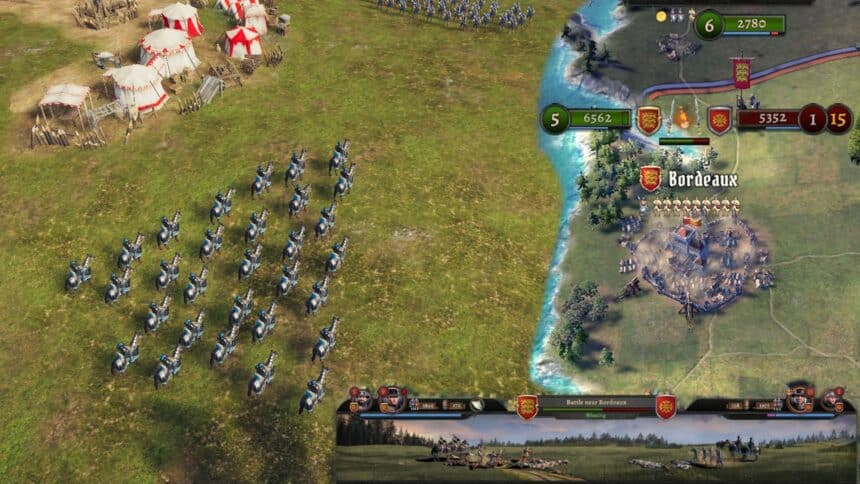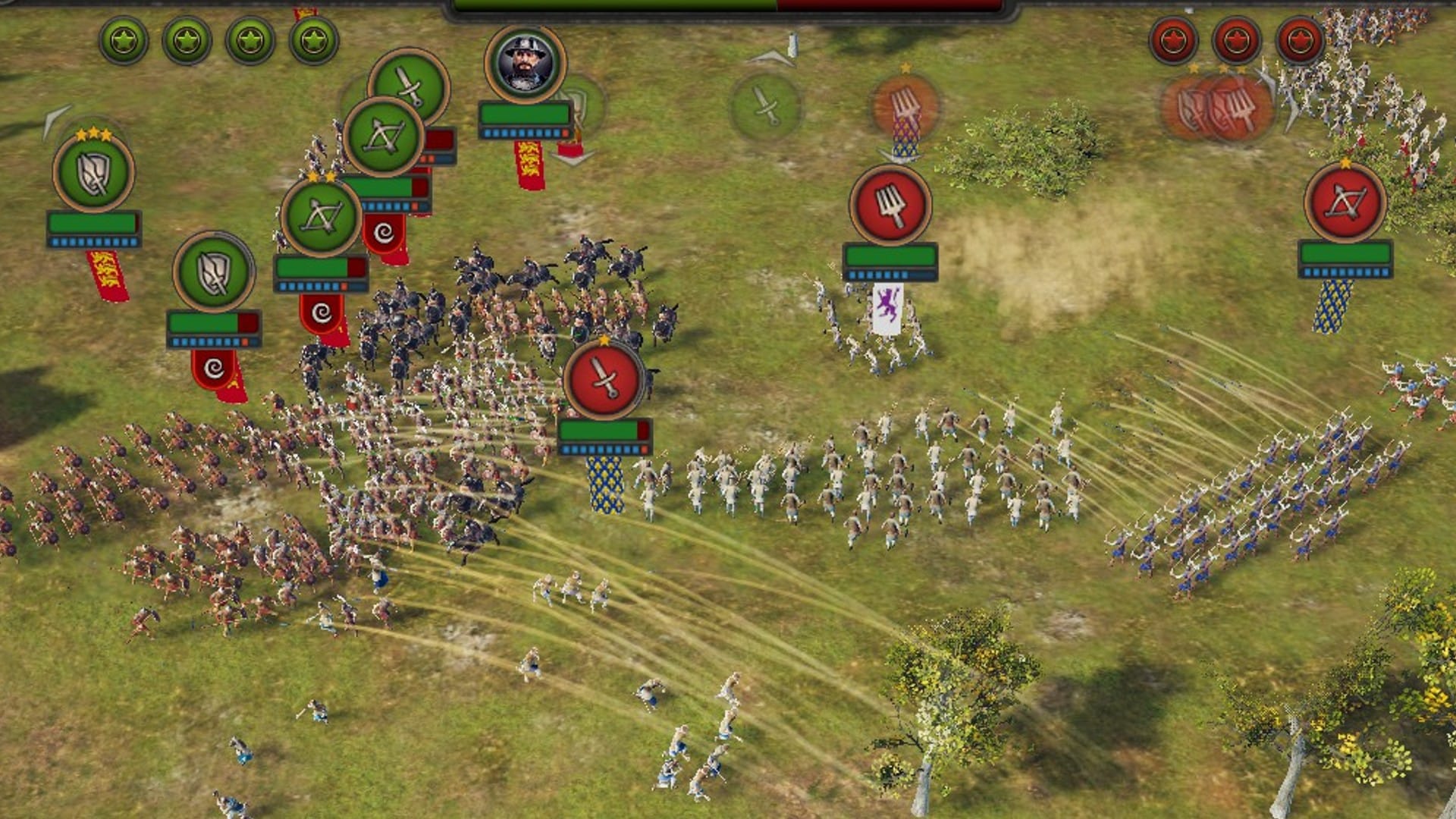The long-awaited sequel to the 2004 title is now getting its proper rebirth. As someone who has been immersed in the Civilization series, I was afraid of touching another time-consuming strategy game.
But surprisingly, all the boxes ticked right for me. I felt like playing Civilization, Crusader Kings, and Total War in one epic title, and I’ve had days where I almost didn’t sleep. Even playing this on Easy mode felt hard already, but it feels rewarding once you get used to the gameplay loop.
Without further ado, here’s a review of one of the best simulator and strategy games that I’ve played so far, Knights of Honor II: Sovereign.
Story
Knights of Honor II: Sovereign takes you back in time to medieval times, and your goal is to dominate the entire European region (and part of Africa). At the beginning of the game, you can pick which region to control.

Do you want to play as the British and take over its surrounding neighbors? Or play as a Catholic Empire and start your own crusade? Perhaps play as an Islamic country and try to spread influence across Europe? The choice is yours.
If you want a bit of a challenge, choose one small province and try hard to dominate the region as I did. I picked a not-so-known faction in Africa called Alodia.
The easiest but most difficult goal to achieve in Knights of Honor II will be taking over the entire European and African regions, which will probably take weeks or even months. Don’t worry, you’ll really feel right at home with this game if you’re an avid fan of Civilization. Prepare for no sleep. Tag some friends along if you want for some lengthy multiplayer action.
Play As You See Fit

In Knights of Honor II: Sovereign, the goal is to score the most victory points, which can be done in many ways. The default setting gives you a goal of reaching 5,000 victory points. You can obtain these points by doing well in economics and diplomatic relations. If you feel barbaric, you can just take over every province on the map.

The game also presents alternate minor victories if you want a somewhat shorter playthrough, and these are your options:
- Greedy Kings – Collect the amount of target gold in your kingdom’s treasury.
- Peasants Rush – You win the campaign by reaching a certain of controlled provinces in the region.
- War for Goods – Develop your economy by producing the selected number of goods while defending it against other kingdoms.
- Destroy Kingdom – A kingdom is randomly from the map, and your goal is to eliminate it.
Presentation & Audio

The large-scale map is very readable, and you can easily identify different provinces. It even has a brief summary of the kingdom, and if you’re a history nerd, this might amuse you.
Knights of Honor II: Sovereign also has some of the best soundtracks I’ve listened to, which greatly increased my immersion. I saw some comments while browsing old Knights of Honor gameplay that they wanted to switch around soundtracks for the first and second installments.
Also, I noticed a drastic performance improvement when I played this game on an SSD over an HDD. With gaming rigs nowadays, playing this on an SSD is more convenient. Though Knights of Honor II: Sovereign is playable on an HDD, expect slower load times and occasional freezing.

In terms of interacting with other kingdoms, I can see some gameplay influence from the Crusader Kings and Civilization franchises. Socializing with the rulers can become a headache in the long run especially if you’re handling a lot of provinces. If you want to be influential across the region, you’re going to need a strong royal court which we’ll be briefly discussing in the next section later on.
Unlike other grand strategy games that are turn-based, Knights of Honor II: Sovereign has more of an RTS implementation in which you can also toggle the game speed. I felt like I was playing Tropico at one point.
The Royal Court
The Royal Court is the bread and butter of Knights of Honor II: Sovereign because they hold the key to your victory. Depending on your chosen kingdom, you may want to strategize which types of royal court members to hire. Here’s a brief list of all the types of members that you can hire.

- Marshal – These are your generals in war. As governors, they can enhance your province’s defenses.
- Merchant – This royal court member is responsible for generating revenue for your kingdom by establishing trade routes with other kingdoms.
- Cleric – They are responsible for spreading influence over your kingdom and can also promote stability to avoid revolts. Clerics can also pacify rebellions if applicable.
- Diplomat – They are in charge of improving relations with other kingdoms making negotiations in the future easier, especially in making peace when your neighboring kingdoms declare war against you.
- Spy – When used correctly, they can turn the tides of battle across kingdoms. They can sabotage other kingdoms’ supply chains, assassinate or bribe faction leaders and gather useful intel.
If you’re a small kingdom, maybe you should strengthen your spy and diplomat network. Take advantage of royal weddings with your neighboring kingdoms because you get to inherit their lands once they die naturally (or through assassination).

If you start off with plenty of provinces, say, for example, you play as England, you may want to stack on some marshals and focus on upgrading your military because there’s a big chance that you’ll be right in the other kingdoms’ line of conflict.

To save you some gold, it’s often better to invite your family members into the royal court rather than hiring. Random events usually happen when the queen in your royal family gives birth, and you can choose which royal court path they can take. Additionally, they can learn skills as they grow up.
Get Ready For Plenty of Micro Management
While reading through this Knights of Honor II: Sovereign review, you’ll realize later on that it may take some time to learn the basics. It probably took me an hour or two to get used to the routines in this game. Don’t worry because the tutorial tooltips provided by the game aren’t that difficult to grasp.

Aside from forming your royal court, you’ll be met with many responsibilities as a ruler, such as building important structures for your provinces, looking for potential kingdoms to propose for a royal wedding, and more.
There are a lot of tech trees to explore as well. Enhance your kingdom with military, population, religion, farming, and seashore upgrades. Take note that upgrading certain structures will apply to all provinces, and future building of these structures will become more expensive.

Each province also has its own mini-village with random perks. They either give away gold, books, religion, commerce, food, or levies. If you assign a governor to your province, the mini-villages around it will receive special perks. For example, a merchant governor can boost a province’s gold supply.

There’s also this ranking where you can see how many victory points you have obtained through your current standing in wealth, society, culture, politics, and conquest. Performing well in these aspects can even get you a nomination for becoming emperor of the world.

Don’t get too pressured with what you want to achieve in Knights of Honor II since this is designed as a sandbox RTS game. I honestly didn’t notice this section until the later parts of my playthrough since I focused more on keeping my resources stable.
Simulation Battles VS Jumping Right Into The Action
Players can either simulate the battle or jump right into the nitty gritty of commanding armies like in Total War. Take note that the game time in the grand map also pauses when you jump into battle.

Regarding battling other kingdoms, we’re presented with a simple manpower counter to see if we have a chance against the enemy. I liked the effort of putting some animations at the bottom to feel further that I’m watching an actual battle take place. At least I didn’t have to dive as often since I mostly relied on my victory chances on manpower numbers and analyzing army compositions.

However, I was a bit overwhelmed by the RTS feature of Knights of Honor II: Sovereign. You can win a grand-scale battle by capturing points on the map or killing enemy commanders.
I always have mixed feelings watching my armies clashing like tiny ants in battles. There was also no thrill when you killed an enemy commander, all you could do was watch the health bars. They could’ve at least put some cutscene to see the army leader get executed for that additional immersive experience.

Honestly, I’m more entertained with watching Hero’s Hour battles over this. Overall, the battle mechanics can be punishing, especially if you don’t pay attention to your enemies’ army composition.
Before even engaging a province, you have to think carefully. It doesn’t make sense to charge a castle with an army of peasants while your enemies have light infantry and bowmen. Unless your leader has perks to fend them off, or you have a spy deployed, you’re just sending your peasants to a death sentence.
The Verdict
Knights of Honor II: Sovereign definitely immersed me into medieval times filled with hundreds of historical kingdoms to explore and lands to conquer. The “Total War” RTS combat style didn’t really stick due to the abundance of management tasks that take priority over combat, but the game has plenty of resources, politics, and tech trees to discover. It felt good once you get used to the routines of trying to make your kingdom the best in Europe. With exceptional presentation and hours of replay value, this is an RTS you can’t miss.

It also has the potential to have community mods in the future if the devs allow it. Imagine having a Game of Thrones mode with this game, wouldn’t that be epic?
We hope you enjoyed reading through our review. If you’re into the Civilization, Total War, and Crusader Kings franchises, you should consider adding Knights of Honor II: Sovereign to your Steam collection.
This review is based on the PC version of Knights of Honor II: Sovereign. The key was provided by Black Sea Games and THQ Nordic.











